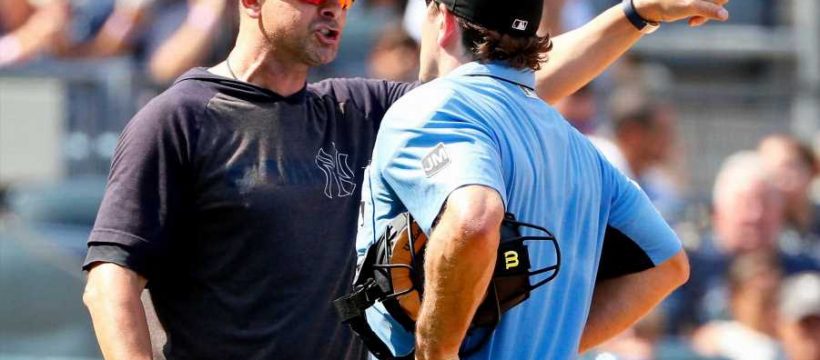Aaron Boone gives off a lanky surfer vibe before and after games. He is cool, calm and connected to inner peace. His eyes are mischievous, not vicious. His tone reassuring, not reverberating.
Before a recent game I went off about something bothering me in the business while we stood near the Yankee Stadium home dugout, and Boone responded by giggling at my 0-to-60 fury, giving me a look like how could someone go so quickly from making a point to unhinged?
But then games begin, and more this year than last, Boone transforms from Dr. Jekyll to certified — from serene to, well, savage. The guy hired and hailed as a 2.0 Joe Torre for his tranquility has found his Lou Piniella, his Billy Martin, his Bobby Cox.
In fact it is Cox, who played for but never managed the Yankees, of whom Boone’s tactics most remind me. Cox, a Hall of Fame manager, is the champion of ejections, getting tossed 161 times, including three in the postseason. That covers a lot of issues over many years.
Cox, though, was renowned for being relentless about the strike zone. His Braves were built on starting pitchers, and Tom Glavine and Greg Maddux were finesse masters who lived on the edges — and beyond. Cox was unceasing in fighting for every millimeter, every borderline call, keeping a running dialogue — and diatribe — toward the home plate umps.
Cox was hunting three benefits:
1. His players, notably those invaluable starters, recognized and appreciated the support Tuesday night in June, primetime in October; first day of the season or big divisional lead in August. Cox was not letting up. He was fighting for them. This was his team’s strength and no way was he allowing one potential strike to vanish without at least a verbal protest.
“It didn’t matter the circumstances, in any game Bobby was fighting for every inch for his players,” Glavine said by phone. “Not just the pitchers, he would fight every inch for the hitters, every inch on the basepaths. He was always fighting. Bobby wanted to win as much as any player. The players noticed and respected it and players wanted to play and fight for Bobby because he fought so much for his players.”
2. Cox was trying to get the 50-50ish calls for his team. Were umps mad at Cox? Sure. But they also wanted him to stop. Human nature is human nature and the way to get it to cease — even subconsciously — is to call the close ones strikes. Think how NBA coaches, for example, tirelessly work the refs.
“I can’t imagine it doesn’t happen,” Glavine said of swaying borderline calls. “The squeaky wheel gets the grease. When someone is constantly yapping at you, somewhere in the recesses of the brain when you have to make a call so quickly, I’m sure you just don’t want to hear it any more. There’s no way to prove it, but I bet it happens.”
3. Cox was trying to tell a team that was winning, often with big division leads, that every game was still precious.
“It would be that Sunday in August and 130 degrees on the field and we are 12 up and this was Bobby’s way to not let us get complacent,” Glavine said. “It was his subliminal way to remind everyone that we have to win and play right. He didn’t believe in coasting and flipping switches come the playoffs. He was still fighting every pitch to keep us with an edge and engaged.”
Boone is 154 ejections behind Cox. He has four this season after three in his rookie 2018. But it is clear he has become more assertive and there are Cox parallels.
Boone believes he has a lineup that understands the strike zone from the batter’s box how Glavine and Maddux did from the mound. He constantly talks about controlling the zone to create the scenario — often a favorable count — to hunt a hittable pitch and put your “A” swing on it.
Bench coach Josh Bard said earlier this year, “We slug to walk.” In other words, they are not looking to take pitches. They are looking to do damage and by doing it scare pitchers out of the strike zone, but they need that zone called correctly in Boone’s view to operate most efficiently.
So Boone fights every borderline pitch to protect his “savages,” who in turn appreciate it, creating a bond with each other and respect toward the manager and a fervor for the pitch-by-pitch battle of the game. Perhaps, it helps sway a borderline call now and then. And there is no doubt it has helped keep the Yankees feisty even with a big division lead.
They are taking nothing for granted — not a game, not a pitch. That starts with their manager.
Source: Read Full Article

